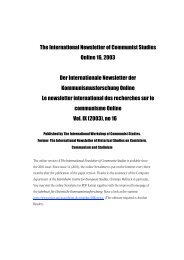VOL. XVI (2010), NO 23 - The International Newsletter of Communist ...
VOL. XVI (2010), NO 23 - The International Newsletter of Communist ...
VOL. XVI (2010), NO 23 - The International Newsletter of Communist ...
Erfolgreiche ePaper selbst erstellen
Machen Sie aus Ihren PDF Publikationen ein blätterbares Flipbook mit unserer einzigartigen Google optimierten e-Paper Software.
<strong>The</strong> <strong>International</strong> <strong>Newsletter</strong> <strong>of</strong> <strong>Communist</strong> Studies Online <strong>XVI</strong> (<strong>2010</strong>), no. <strong>23</strong> <strong>23</strong><br />
Bolshevik colonial practice (e.g. in Central Asia). 38 Further research will show if the worldrevolutionary<br />
episodes named above are operable and whether it is really possible to<br />
consider the Soviet repercussion <strong>of</strong> these episodes detached from each other.<br />
<strong>The</strong> preoccupation with internationalist representations and practices hopefully can enrich<br />
historiography in various aspects. In relation to “classical” communist studies and Comintern<br />
history, the results <strong>of</strong> this research may give new insights into the connection between Soviet<br />
inner policy and the policies <strong>of</strong> international communism. For example, one preliminary result<br />
<strong>of</strong> the undertaken research may be that the hasty foundation <strong>of</strong> the <strong>Communist</strong> <strong>International</strong><br />
in March 191939 happened at least in parts owing to a necessity for the Bolsheviks to adhere<br />
to overdue propaganda promises, since the call for a “3 rd <strong>International</strong>” dominated Soviet<br />
public discourse already in mid-1918. 40 Contributing a Soviet perspective to classical topics<br />
<strong>of</strong> communist studies is also possible concerning later episodes, like the abortive “German<br />
October” <strong>of</strong> 19<strong>23</strong>: While the meticulous planning <strong>of</strong> the German uprising by the Russian<br />
<strong>Communist</strong> Party is already well documented, 41 the dimensions <strong>of</strong> the large-scale<br />
accompaniment <strong>of</strong> the anticipated “German events” by print and audiovisual agitation in the<br />
Soviet Union, planned with at least the same military precision as the uprising itself (only with<br />
more success), are less known. <strong>The</strong> same research gap applies to the attitudes <strong>of</strong> “ordinary”<br />
citizens towards the “German October”, which the unearthed reports <strong>of</strong> Bolshevik agitators<br />
from late 19<strong>23</strong>42 are able to shed a light on. Here we are already dealing with “new”<br />
communist studies, a cultural history <strong>of</strong> the Comintern and the communist movement, to<br />
which the illumination <strong>of</strong> representations and discourses concerning the Comintern, World<br />
Revolution, international solidarity and the communist movement might contribute new<br />
insights.<br />
As for the dissertation’s contribution to Soviet history, the topic <strong>of</strong> internationalist<br />
representations and practices touches upon several central aspects. First <strong>of</strong> all, it is the one<br />
<strong>of</strong> sense-making and legitimisation <strong>of</strong> power. <strong>The</strong> relation <strong>of</strong> the Bolshevik elites as well as<br />
the “masses” towards the outside world oscillates between the joyous anticipation <strong>of</strong> World<br />
Revolution and the fear <strong>of</strong> a real and imagined “bourgeois-imperialist encirclement”. In this<br />
dichotomy, revolutionary internationalism plays a central role. Connected with this is also the<br />
relatively unexplored problem <strong>of</strong> Soviet everyday representations <strong>of</strong> the outside world. 43<br />
Likewise, since the contrast between an internationalist and national Soviet policy was a<br />
crucial factor for the genesis <strong>of</strong> Stalinism, the results <strong>of</strong> the project could be useful for an<br />
analysis <strong>of</strong> Stalinism, even though the project is explicitly distancing itself from reducing the<br />
whole Early Soviet period to a pre-history <strong>of</strong> Stalinism.<br />
38 For the Bolsheviks’ relation to Central Asia and the local revolutionaries, see: Christian Teichmann: Cultivating<br />
the Periphery. Bolshevik Civilising Missions and ‘Colonialism’ in Soviet Central Asia. // Comparativ 19 (2009), 1, pp.<br />
34-52; Adeeb Khalid: Backwardness and the Quest for Civilization. Early Soviet Central Asia in Comparative<br />
Perspective. // Slavic Review 65 (2006), 2, pp. <strong>23</strong>1-251; Henryk Szlajfer: From Empire to Empire. Russian versus<br />
Asian Revolutionaries. 1917-1920. // Richard L. Rudolph, David F. Good (eds.): Nationalism and Empire. <strong>The</strong><br />
Habsburg Empire and the Soviet Union, New York, St. Martin's Press, 1992, pp. 135-157.<br />
39 See e.g.: Branko Lazitch, Milorad M. Drachkovitch: Lenin and the Comintern, Stanford, Hoover Inst. Press, 1972,<br />
p. 50ff.<br />
40 th<br />
For example, see the greeting address <strong>of</strong> the 6 Congress <strong>of</strong> Moscow Railroad Workers’ Deputees (August<br />
1918) to the striking Ukrainian railroad workers, carrying an appeal “to merge under the banners <strong>of</strong> the 3 rd<br />
<strong>International</strong> into one worldwide family <strong>of</strong> labour” (State Archive <strong>of</strong> the Russian Federation [GARF], f. 1<strong>23</strong>5 op. 93 d.<br />
2 l. 138); a glimpse through the front pages <strong>of</strong> the “Pravda” only confirms this impression.<br />
41 See: Bernhard H. Bayerlein, Leonid G. Babičenko, Fridrich I. Firsov, Aleksandr Ju. Vatlin (eds.): Deutscher<br />
Oktober 19<strong>23</strong>. Ein Revolutionsplan und sein Scheitern, Berlin, Aufbau, 2003.<br />
42 RGASPI, f. 17 op. 60 d. 460.<br />
43 Cf.: Donald J. Raleigh: Doing Soviet History. <strong>The</strong> Impact <strong>of</strong> the Archival Revolution. // Russian Review 61 (2001),<br />
pp. 16-24, here: p. <strong>23</strong>; Covering both aspects, see recently: Aleksandr V. Golubev: "Esli mir obrushitsia na nashu<br />
Respubliku". Sovetskoe obshchestvo i vneshniaia ugroza v 1920-1940-e gg., Moskva, Kuchkovo pole, 2008.














